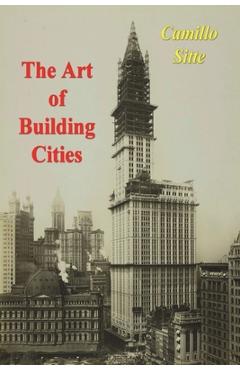The Art of Building Cities: City Building According to Its Artistic Fundamentals - Camillo Sitte

Detalii The Art of Building Cities:
The Art of Building Cities: - Disponibil la libris.ro
Pe YEO găsești The Art of Building Cities: de la Camillo Sitte, în categoria Architecture.
Indiferent de nevoile tale, The Art of Building Cities: City Building According to Its Artistic Fundamentals - Camillo Sitte din categoria Architecture îți poate aduce un echilibru perfect între calitate și preț, cu avantaje practice și moderne.
Preț: 66.59 Lei
Caracteristicile produsului The Art of Building Cities:
- Brand: Camillo Sitte
- Categoria: Architecture
- Magazin: libris.ro
- Ultima actualizare: 11-04-2024 01:14:23
Comandă The Art of Building Cities: Online, Simplu și Rapid
Prin intermediul platformei YEO, poți comanda The Art of Building Cities: de la libris.ro rapid și în siguranță. Bucură-te de o experiență de cumpărături online optimizată și descoperă cele mai bune oferte actualizate constant.
Descriere magazin:
Camillo Sitte (1843-1903) was a noted Austrian architect, painter and theoretician who exercised great influence on the development of urban planning in Europe and the United States. The publication at Vienna in May 1889 of Der Stadtebau nach seinen künstlerischen Grundsatzen (The Art of Building Cities) began a new era in Germanic city planning. Sitte strongly criticized the current emphasis on broad, straight boulevards, public squares arranged primarily for the convenience of traffic, and efforts to strip major public or religious landmarks of adjoining smaller structures regarded as encumbering such monuments of the past. Sitte proposed instead to follow what he believed to be the design objectives of those whose streets and buildings shaped medieval cities. He advocated curving or irregular street alignments to provide ever-changing vistas. He called for T-intersections to reduce the number of possible conflicts among streams of moving traffic. He pointed out the advantages of what came to be know as turbine squares--civic spaces served by streets entering in such a way as to resemble a pin-wheel in plan. His teachings became widely accepted in Austria, Germany, and Scandinavia, and in less than a decade his style of urban design came to be accepted as the norm in those countries.

Produse asemănătoare
Produse marca Camillo Sitte

The Art of Building Cities: City Building According to Its Artistic Fundamentals - Camillo Sitte
![]() libris.ro
libris.ro
Actualizat in 11/04/2024
66.59 Lei